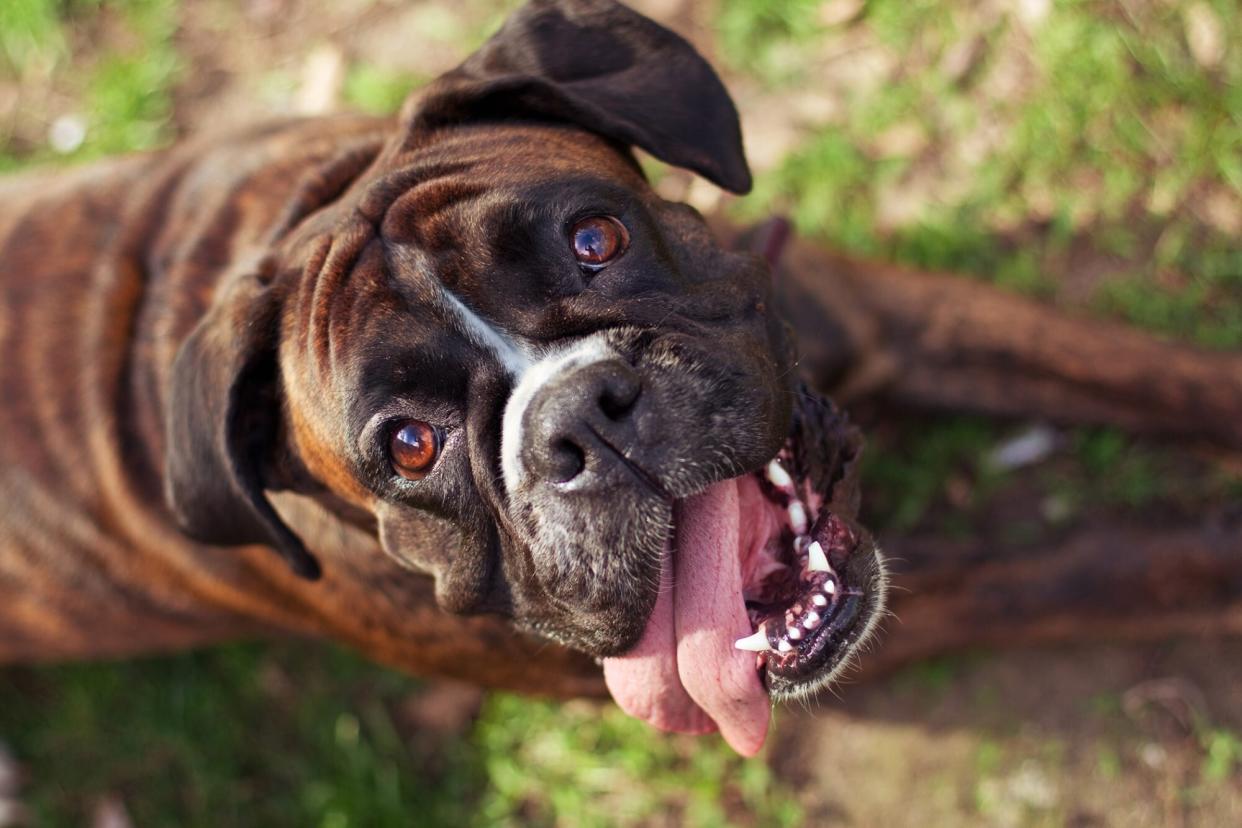Labored Breathing in Dogs: Causes, Treatment, and Prevention

Lyubov Timofeyeva / Shutterstock
TABLE OF CONTENTS
On This Page
What Is Labored Breathing in Dogs?
Causes
Signs
Diagnosis
Treatment
Prognosis
Prevention
Breathing is one of those essential life functions we take for granted, rarely paying attention to it until something goes wrong. If you're noticing that your pet is having difficulty breathing, don't watch and wait. Contact a veterinary professional immediately.
Labored breathing in dogs is a common cause of trips to the emergency room for our pups. Here's what causes labored breathing and what to expect if your pet is experiencing difficulty breathing.
What Is Labored Breathing in Dogs?
When it comes to labored breathing, we're not talking about your dog's typical panting after a play session or a jaunt around the neighborhood. Specifically, labored breathing (dyspnea) refers to difficulty breathing in, breathing out, or both. With dyspnea, your pet puts more effort into breathing.
Simply breathing fast (tachypnea) or panting isn't always a concern, but if your pet hasn't recently exercised and isn't breathing to cool their body down, then fast breathing and excessive panting can also mean trouble. Sometimes, you may see labored breathing in conjunction with rapid breathing or heavy panting.
Causes of Labored Breathing in Dogs
Labored breathing doesn't happen without a cause, which could include:
Breed-specific issues, such as brachycephalic airway syndrome
Laryngeal paralysis, which is a dysfunction of the larynx that results in airway obstruction
Foreign object in the airway
Bronchitis
Metabolic diseases
Trauma (like getting hit by a car or a fight with another dog)
Cancer of the chest, airways, or throat
Signs and Symptoms
It can be difficult to imagine what labored breathing in dogs looks like if you've never experienced it before. Signs of labored breathing in dogs include:
Changes to posture including hunched appearance, extended neck, or sitting with elbows spread out
Open-mouthed breathing
Coughing, especially at night
Bluish tinge to gums
Foaming from mouth
Increased abdominal effort with breathing
Exercise intolerance
Fast breathing (over 40 breaths per minute)
Anxiety, restlessness, pacing
Constant panting
Hoarse bark
Immediately bring your dog to the nearest open veterinary clinic if you notice any of these signs. If it's after hours, you'll need to find a nearby veterinary emergency facility.
RELATED: Is Your Dog Wheezing? Here's What Might Be Causing It and When To Call a Veterinarian
Diagnosis of Labored Breathing in Dogs
Your veterinarian will know if your dog is experiencing labored breathing by examining them. Diagnostics will focus on figuring out the underlying cause for the labored breathing and could include:
Blood work
Measuring blood oxygen levels
Chest X-rays
Echocardiogram (ultrasound of heart) and electrocardiogram (recording of heart's electric activity)
Sedated examination of the larynx
Additional diagnostics, such as a CT scan, might be recommended depending on initial findings.
Treatment
Regardless of the underlying cause, your dog will likely need to be hospitalized. If your pet's oxygen levels are low, they will need extra oxygen delivered via an oxygen kennel or nasal tube. Your dog will be closely monitored by staff 24 hours a day during hospitalization.
In some situations, there is excessive fluid or air in the chest or abdomen. In that case, your veterinarian may place a needle into the affected area, or "tap" it, to remove the fluid or air, providing some immediate relief to your pet. A chest tube may be placed to continue the drainage of fluid or air from the chest.
Other treatments could include steroids to reduce inflammation, antibiotics to fight infection, bronchodilators, diuretics to remove excess fluid, and other heart medications. Some causes of labored breathing may require surgery, such as laryngeal paralysis, brachycephalic airway syndrome, or a hernia in the diaphragm.
In severe cases, a ventilator may be recommended. This can become cost-restrictive for many pet parents.
What's the Prognosis for Dogs with Labored Breathing?
After figuring out what's causing your pet's labored breathing, your veterinarian will better understand how well they expect your pet to do with treatment. Some causes of labored breathing, such as brachycephalic airway syndrome, can have a good prognosis if treated early and appropriately.
Trauma cases that survive the first one to two days are likely to do all right longterm. Pneumonia prognosis ranges from good to guarded, depending on type and severity. Some causes of labored breathing, such as various cancers, carry a poor prognosis. Heart failure is often manageable at first, with most pets living around nine months after diagnosis.
RELATED: Can Dogs Have Asthma? How To Treat Your Pup's Breathing Problems
How to Prevent Labored Breathing in Dogs
Getting regular wellness exams for your dog is the best way to prevent conditions that may lead to labored breathing. Not only can your veterinarian keep your pet up-to-date on vaccinations that prevent infectious diseases, but their physical exam may also uncover the causes of labored breathing before your pet is experiencing this distressing symptom.
For example, if your veterinarian hears a heart murmur when they listen to your pet's heart, they can detect heart disease before congestive heart failure develops and start them on medications that may delay heart failure for several years.
For some dogs, such as those with brachycephalic airway syndrome, surgical procedures may prevent labored breathing.
Lastly, keep your pet on a leash when going for walks, and don't allow them outside unleashed unless they're in a fenced yard. If your pet is hit by a car, have them evaluated by a veterinarian promptly. Sometimes, labored breathing doesn't develop immediately after the incident, and their prognosis will be better if they're already being monitored by a veterinarian.

